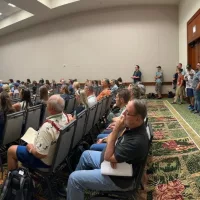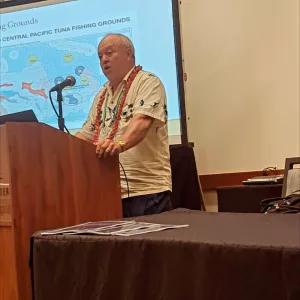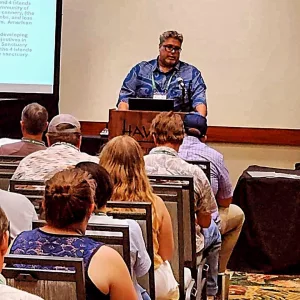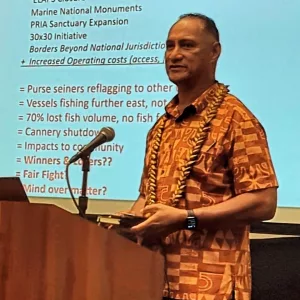
Presentations by delegates from American Samoa at the annual meeting of the American Fisheries Society in Honolulu last week highlighted the devastating effects that a proposed expansion of the National Marine Sanctuary in the Pacific Remote Islands would have on American Samoa.
Presenters at the meeting included Director of Marine and Wildlife Resources, Taotasi Archie Soliai, Taulapapa Will Sword, Chairman of the Western Pacific Regional Fishery
Management Council and Nate Ilaoa, Chair of the Council Advisory Panel.
The session provided a platform for the local perspective, with Soliai, Sword, and Ilaoa addressing cultural, economic, and procedural concerns surrounding the proposal — particularly its impact on the people of American Samoa.
A key theme emphasized was the lack of transparency and inclusive stakeholder  engagement during the process.
engagement during the process.
Chairman Sword’s presentation, titled “The Inherent Evil of Closing Off the Pacific Remote Island Areas for Commercial Fishing,” argued that the primary beneficiary of the proposed closure would be China.
Sword remarked, “American Samoa is being ignored by the powerful US Government, which says one thing and does another; further, the main beneficiary for this closure is China. American Samoa is the nation’s third largest fishery in value now, but was number one in 1997; yet, NOAA has been slowly destroying it for the last two decades. This is a disservice to the nation and American Samoans.”
Nate Ilaoa highlighted the strong opposition in American Samoa to the proposed expansion. “The need for comprehensive and inclusive social, cultural, and economic impact analysis is argued, as well as culturally effective engagement with the affected community. This is a legal and an Equity and Environmental Justice issue,” said Ilaoa, reinforcing the call for more inclusive decision-making processes.
expansion. “The need for comprehensive and inclusive social, cultural, and economic impact analysis is argued, as well as culturally effective engagement with the affected community. This is a legal and an Equity and Environmental Justice issue,” said Ilaoa, reinforcing the call for more inclusive decision-making processes.
Director Soliai’s presentation, entitled “The US vs. American Samoa: A Fair Fight Against the Proposed Monument Expansion,” likened the current struggle to the biblical story of David vs. Goliath, but in this case, Soliai argued that “David,” representing American Samoa, is facing an insurmountable challenge as “Goliath,” symbolizing the U.S. Government, continues to marginalize small communities in its federal policy formulations. He said, “This expansion, while purportedly aimed at environmental conservation, threatens to inflict irreversible harm on the socio-economic fabric of the territory.”
Soliai emphasized that 53% of the U.S. Exclusive Economic Zone (EEZ) in the Western Pacific is already closed to commercial fishing, questioning why indigenous Pacific people should bear the brunt of meeting President Biden’s 30×30 conservation initiative under Executive Order 14008.
He concluded with a call to action, stating, “At the end of the day, an often ignored but very important aspect of these policies is the human dimension. People’s lives and ability to put food on the table are in jeopardy. We remain concerned and will continue to fight and advocate for the best interests of our indigenous people, regardless of who is on the other side.”



